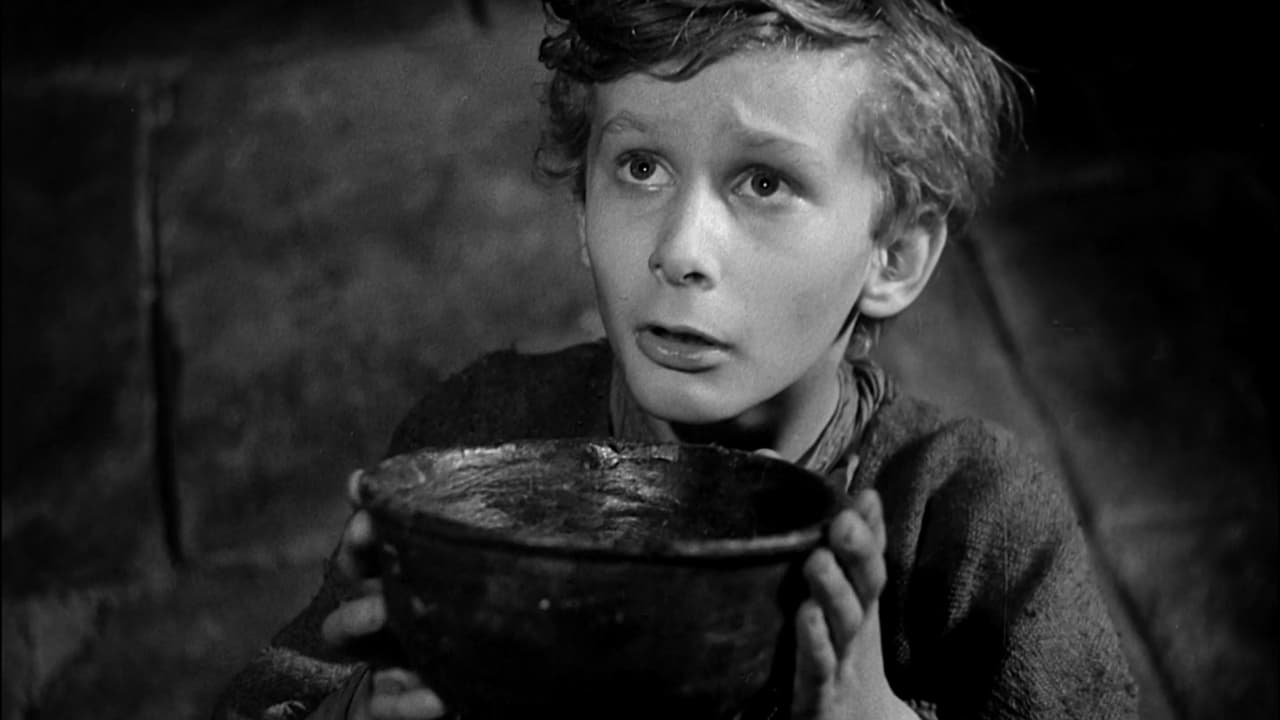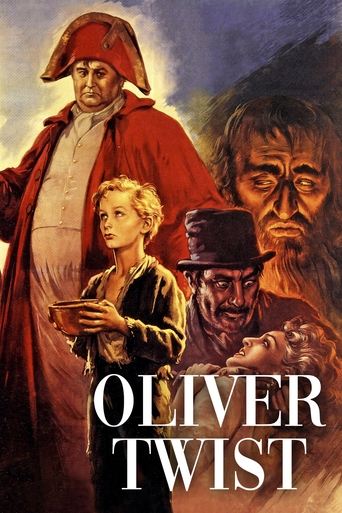

Truly Dreadful Film
... View Morea film so unique, intoxicating and bizarre that it not only demands another viewing, but is also forgivable as a satirical comedy where the jokes eventually take the back seat.
... View MoreIt's funny, it's tense, it features two great performances from two actors and the director expertly creates a web of odd tension where you actually don't know what is happening for the majority of the run time.
... View MoreOne of the most extraordinary films you will see this year. Take that as you want.
... View MoreI think I am fair in saying that Oliver Twist (1948) is magnificent and superb piece of motion picture art. Without a doubt it is one of the finest screen translations of a literary classic ever made.This Masterpiece was so representational of its time that it even inspired the manufacture of products deemed to be iconic of the time such as London Distilled Gin known as Oliver Twist London Distilled Gin (See it here http://www.olivertwistgin.com . The film and literary work alike portray the real hardships and massive cultural divide that formed Dickensian London. Although the film is a softer interpretation of the book it is a fantastic tool for educating people about these times.Ensure you watch this classic and if you have not done so yet read the classic novel.
... View More"Oliver Twist" is the second of David Lean's two film adaptations of Charles Dickens novels, following "Great Expectations" from two years earlier. As in the earlier film, Lean keeps fairly closely to Dickens' plot, although there are some simplifications- the Rose Maylie sub-plot is omitted- and a few changes, such as making Mr. Brownlow Oliver's grandfather. Lean does, however, keep the character of Monks, omitted in some adaptations such as the 1968 musical version "Oliver!" and Polanski's recent film.The film has a couple of faults, but these are generally those of the novel itself. Oliver, as played by the young John Howard Davies, is just a bit too idealised to be true, but then so is Oliver as written by Dickens. I also thought it might have been more realistic if Oliver had spoken with a working-class Midlands accent- his home town is supposed to be around a hundred miles north of London- rather than a posh Home Counties one. (In later life, Davies was to become an influential BBC producer responsible for, among other things, "Monty Python's Flying Circus").More importantly, Dickens' blatant anti-Semitism makes "Oliver Twist" his most problematic novel for modern readers; indeed, it was problematic even for nineteenth-century readers, and towards the end of his life Dickens himself came to recognise that he had wronged the Jewish people in his portrait of Fagin. (He tried to make amends by creating the virtuous Jewish character of Riah in "Our Mutual Friend"). This is a difficult problem to overcome in stage, television or cinema adaptations of the story; when writing his musical Lionel Bart sidestepped it by making Fagin a lovable old rogue, which is certainly not how Dickens saw him.Lean, however, does not even seem to have realised that the problem exists, because in this version Fagin appears with a huge hooked nose. This was presumably done to make him resemble George Cruikshank's illustrations in the first edition of the novel, but in 1948, only three years after the end of the war, audiences might have been reminded not of Cruikshank but of the hateful anti-Semitic caricatures from "Der Stuermer". The British Board of Film Censors do not appear to have been troubled by this aspect of the film, but it aroused considerable controversy in America where the film was not released until 1951, and then only in an expurgated version. Bizarrely, the film was banned both in Israel, on the grounds of anti-Semitism, and in Egypt, on the grounds that Lean had made Fagin too sympathetic.And yet, despite this flaw, this is a superbly-made film. If it shares its faults with the novel, it also shares many of that work's great qualities, such as its characterisation. The acting is uniformly excellent. There are too many first-rate performances for me to single them all out, although I must mention Alec Guinness as Fagin, Francis L. Sullivan as the beadle Mr. Bumble, the young Anthony Newley (later to become, among other things, the second Mr Joan Collins) as the Artful Dodger and Robert Newton as Fagin's vicious partner-in-crime Bill Sikes. (Newton seemed to specialise in flamboyant villains; his best-known screen role was Long John Silver, whom he played several times).Lean is also able to reproduce in cinematic form another great Dickensian characteristic, the ability to blend various elements- humour, social concern and drama- into a seamless whole. Dickens' gift for satire means the humour and social concern are often combined, particularly in the scenes involving Bumble. His pomposity and his mangling of the English language make him, in both book and film, a superbly comic character, yet as we laugh at him we are always well aware that he is not just a figure of fun but also the callous and hypocritical representative of the hated Poor Law and the inhuman workhouse system which Dickens detested."Oliver Twist" contains some of Dickens' most dramatic scenes, which Lean transfers brilliantly to the screen. The two which particularly stood out were the opening scene, in which Oliver's mother makes her way through the storm to the workhouse where she will die in childbirth, and the closing one where Sikes tries desperately to escape across the rooftops with a captive Oliver.I have always regarded Lean's Dickens adaptations as his first two great films; some might make that claim for "Brief Encounter" from 1945, but in my view that film, despite some brilliant directorial touches, suffers from an indifferent script and some indifferent acting. With "Great Expectations", despite some unorthodox casting, everything- direction, script and acting- came together to produce a masterpiece, and in "Oliver Twist" Lean, if possible, excelled even the high standards he had set in the earlier film. But for the flaw I mentioned earlier, this would have been one of my few examples of a "perfect 10". These two films are the greatest Dickens adaptations I have seen and, together with the likes of the Laurence Olivier/Greer Garson "Pride and Prejudice" and Schlesinger's "Far from the Madding Crowd", among the greatest adaptations of any classic British novels. 9/10
... View MoreI can't even believe there are people who prefer this narrative jalopy to Lean's infinitely finer 'Great Expectations.' Oliver Twist is simpleton fodder. The waif protagonist is NOT interesting. He is acted upon, and actions occur around him because having a child protagonist is essentially uninteresting and problematic. Because he's so helpless and feeble (read: virtuous), nothing complex can happen to him without introducing some adult agents. Any danger Oliver experiences, lost its threat 50 years ago from over-familiarity. Every Dickens story involves illegitimacy and tiresome coincidences. OT features the biggest whopper of a coincidence in all of Dickens oeuvre: Imagine you're an orphan who doesn't know who your parents are. Imagine yourself lost in a massive city. Imagine the first person you steal from, just happens to be your long-lost grandfather. Oh come on... what a hideous, clumsy, amateurish device. Bill Sikes is one dimensional. Nancy's motives shift inexplicably. I found nothing interesting in this non-complex plot from the very first viewing. Only Great Expectations miraculously escaped Dickens tiresome, facile morality. The only reason this receives three stars is for the dramatic b/w camera work.
... View MoreDavid Lean's version of Charles Dickens book, "Oliver Twist" is the best Dickens adaption. Right from the brilliant opening, when a storm erupts as Olivers mother desperately runs to a workhouse to give birth, to the excellently executed climax, it certainly far better than Lean's earlier Dickens adaption, "Great Expectations" (1946). Most of the cast return from the earlier movie, including the wonderful Francis L. Sullivan as "Mr. Bumble". Alec Guinness as "Fagin" is the best one yet, even if Ben Kingsley comes a close second. The screenplay whisks through the events quickly, but competently. The only let-down is some rather to obvious painted backdrops. Otherwise the film is a dream.
... View More